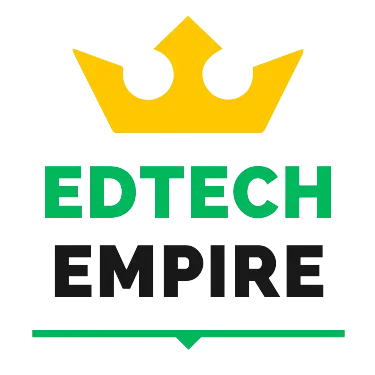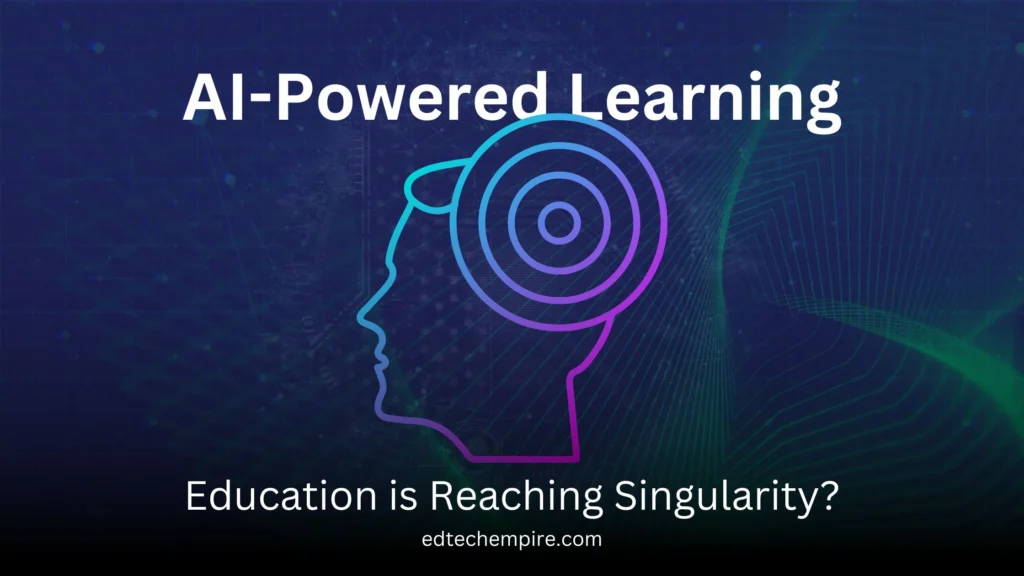![]()
Fasten your seatbelts because the classroom is about to launch into a whole new dimension, propelled by the phenomenal advancements in Artificial Intelligence (AI). Say goodbye to those dusty old textbooks and monotonous lectures— AI-powered learning is transforming the educational landscape, making learning personalized, captivating, and more impactful than ever before. It’s like having a personal tutor, a creative muse, and a super-efficient assistant all rolled into one!
AI-powered learning is not just a futuristic fantasy; it’s happening right now. From personalized learning platforms to AI-driven assessment tools, the possibilities are limitless.
AI-Powered Learning is Revolutionizing Every Subject
Let’s take a journey through different subjects and see how AI-powered learning is making a splash:
- Language Arts: Remember those days of staring at a blank page, struggling with writer’s block? Well, AI-powered learning is here to rescue you. ChatGPT, a sophisticated language model, can spark your creativity with unique writing prompts, offer personalized feedback on essays, and even act as your grammar guru, polishing your writing to perfection. Additionally, AI-powered language translation tools can open up a world of literature, allowing students to explore stories from different cultures. With AI as their companion, students can transform into masterful storytellers and wordsmiths. Consider reading: Using ChatGPT in Education: Guide for Teachers.
- Mathematics: AI-powered learning is taking the fear out of math, making it more accessible and engaging. Platforms like Khan Academy offer personalized math tutoring, adapting to each student’s learning style and providing step-by-step guidance through complex problems. ChatGPT 4o or 1o, the latest iteration, can even solve math problems from images! Just imagine snapping a picture of that tricky geometry problem and letting ChatGPT work its magic. AI-powered learning is empowering students to tackle math with confidence. Consider reading: The Future of Learning Management Systems (LMS).
- Science: AI-powered learning is bringing the thrill of scientific discovery to the classroom without the risks of real-life experiments. Interactive simulations allow students to conduct experiments in a virtual environment, exploring concepts like dissecting a frog or understanding complex chemical reactions. It’s like having a virtual laboratory at your fingertips! AI-powered learning is fostering a generation of budding scientists, eager to explore the wonders of the world around them.
- Social Studies/History: AI-powered learning is breathing life into history, making it more interactive and engaging. Students can journey through time with interactive historical timelines, exploring key events and figures. Imagine taking a virtual field trip to ancient Rome, marveling at the Colosseum and the Pantheon, all from the comfort of your classroom. AI-powered tools can also assist students in analyzing historical documents, equipping them with the skills of a seasoned historian. With AI-powered learning, history is no longer just about memorizing dates and facts—it’s about experiencing the past in a dynamic and meaningful way.
AI-Powered Assessment: Grading Gets Smarter
AI-powered learning is not limited to just learning content; it’s also transforming the way we assess student progress. Generative AI can play a crucial role in creating intelligent assessment tools that analyze student responses, provide instant feedback, and generate detailed reports. Imagine a world where grading is objective, efficient, and personalized. That’s the power of AI-powered learning!
Here’s how AI-powered learning is changing the assessment game:
- Automated Grading: AI algorithms can grade assignments, like essays and coding projects, with remarkable accuracy, freeing up valuable teacher time and minimizing human error. This not only saves time but also provides students with immediate feedback, facilitating their learning and growth in real time.
- Personalized Feedback: AI-powered assessment tools can go beyond simply assigning grades; they can provide tailored feedback based on individual student performance. This allows teachers to identify areas where students need additional support and provide targeted interventions. Personalized feedback empowers students to take ownership of their learning and strive for continuous improvement. Consider reading: 10 Educational Innovations That Are Revolutionizing the Classroom.
- Objectivity and Efficiency: AI-powered assessment brings objectivity to the grading process, eliminating potential biases that can creep into human evaluation. It also streamlines the assessment process, making it more efficient and allowing teachers to focus on other essential aspects of teaching.
- Accessibility for All: AI-powered assessment can make testing more accessible to students with disabilities. For example, AI can convert text-based questions into audio or visual formats, catering to students with visual or auditory impairments. AI-powered learning is committed to creating an inclusive learning environment where all students can thrive.
Google’s NotebookLM: Your AI-Powered Note-Taking Sidekick
Let’s meet Google’s NotebookLM, an AI-powered tool that’s revolutionizing the way we take and utilize notes. It’s like having a brilliant study partner who can organize your thoughts, answer your questions, and help you make connections.
Here’s how NotebookLM is changing the note-taking game:
- Teachers: NotebookLM can be a teacher’s best friend, assisting in creating lesson plans, study guides, and identifying key concepts from lecture notes. It’s like having a personal assistant to streamline your workload and ensure you’re delivering the most impactful lessons. Teachers can even create a podcast utilizing their personalized notes on different topics and share with their students.
- Students: Struggling with a tough concept? NotebookLM is here to help. This AI-powered tool can answer your questions, generate concise summaries of complex topics, and even connect seemingly disparate ideas, making learning more meaningful and enjoyable. Students can add up to 50 different sources in the form of documents, links and texts for a particular topic and then ask AI to summarize, prepare study guide, break down the concept, etc using NotebookLM. It’s like having a 24/7 tutor at your disposal!

Consider reading: Teaching in the Age of ChatGPT.
I have used the NotebookLM for a review of the Edtech Empire blog site providing links to some of my previous posts and it prepare a review podcast on the site within a few minutes. Here is output that you can check out:
The Impact of AI-Powered Learning on Education
AI-powered learning is not just a cool technological trend; it’s a fundamental shift in how we approach education, with the potential to unlock a world of possibilities.
Here are some of the key benefits of incorporating AI-powered learning into education:
- Personalized Learning: AI-powered learning moves away from the traditional one-size-fits-all approach to education, recognizing that every student learns differently. By tailoring learning to each student’s individual needs, pace, and learning style, AI-powered learning ensures that every student has the opportunity to succeed.
- Boosted Student Engagement: AI-powered learning injects excitement and interactivity into the learning process. With engaging games, simulations, and virtual reality experiences, learning transforms from a passive activity into an immersive adventure. Students are actively participating, exploring, and discovering, making learning more enjoyable and effective.
- Supercharged Teacher Efficiency: AI is like a superhero sidekick for teachers, helping them streamline tasks and focus on what truly matters: inspiring and guiding their students. By automating tasks like grading and administrative duties, AI-powered learning frees up valuable teacher time, allowing them to dedicate more energy to personalized instruction and student support.
Consider reading: Teaching AI Prompt Engineering to Students: Importance, Tips and Prospects.
Navigating the Ethical Landscape
As we embrace the transformative power of AI-powered learning, it’s crucial to proceed with caution and address the ethical considerations that arise.
Here are some key ethical considerations to keep in mind:
- Bias Detection and Mitigation: AI algorithms are trained on vast amounts of data, and if that data reflects existing biases, those biases can be embedded in the algorithms themselves. It’s essential to ensure that AI tools are fair and equitable, providing equal opportunities for all students, regardless of their background or characteristics. Regular audits and evaluations of AI systems can help identify and mitigate potential biases.
- Humans at the Helm: AI should be viewed as a powerful tool to enhance education, not as a replacement for human educators. Critical thinking, creativity, and social-emotional skills remain essential components of a well-rounded education. Teachers play a vital role in guiding students, fostering their critical thinking abilities, and ensuring that AI is used responsibly and ethically.
The Future of Education: AI is Leading the Way
AI is rewriting the rules of education, opening up a world of possibilities for personalized, engaging, and effective learning experiences. By embracing AI-powered learning responsibly and ethically, we can create an educational landscape where all students have the opportunity to thrive and reach their full potential. The future of education is dazzling, and AI is illuminating the path forward.


